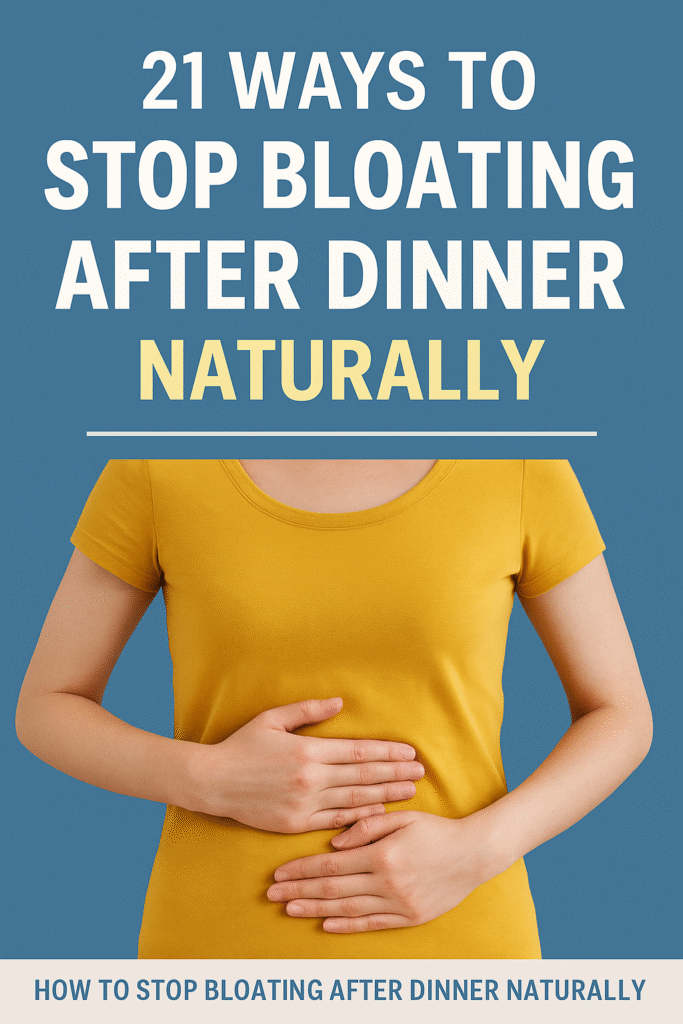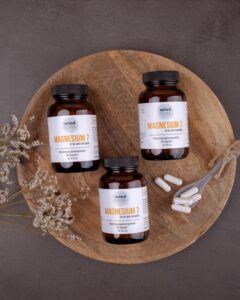Ever Felt Like You Swallowed a Balloon After Dinner? Dinner should feel like a reset, a moment to unwind after a long and demanding day. Yet for many people, the evening ends with tight clothing, excessive burping, or a swollen abdomen that makes sitting or lying down uncomfortable.
If this happens to you regularly, it is not a coincidence, post-dinner bloating is extremely common, and it is not always caused by overeating. In many cases, bloating is a digestive signal that something is not working efficiently.
Your gut may be struggling to break down food, handle certain ingredients, or keep gas moving through the intestines. When digestion slows or becomes inefficient, pressure builds, fermentation increases, and bloating follows.
The encouraging part is that bloating does not have to be managed with laxatives, detox teas, or frequent antacid use, with the right approach, natural remedies for bloating after dinner can support digestion, reduce gas formation, and restore comfort without disrupting your gut’s balance. Before fixing the problem, it helps to understand what causes it.
What Causes Bloating After Dinner?
Evening bloating often results from a combination of habits, food choices, and digestive efficiency. Common triggers include:
Eating too quickly, which leads to swallowing excess air and incomplete digestion
Heavy, fried, or high-fat meals that slow stomach emptying
Carbonated drinks that introduce gas directly into the digestive tract
Food intolerances such as dairy, gluten, eggs, or certain vegetables
Digestive conditions like IBS or small intestinal bacterial overgrowth
Low stomach acid, which allows food to ferment instead of digest properly
Stress or slouched posture during meals, both of which impair digestion
Sitting or lying down immediately after eating, which traps gas
Bloating is rarely random, it usually follows a pattern tied to specific foods, behaviors, or times of day. Identifying your personal triggers is half the solution. The other half is using targeted natural remedies for bloating after dinner that support digestion instead of masking symptoms.
21 Natural Remedies for Bloating After Dinner
1. Peppermint Tea: Your Gut’s Best Friend
Peppermint contains menthol, a natural compound that soothes and relaxes the smooth muscles in your gastrointestinal (GI) tract. This allows trapped gas to pass through more easily and helps relieve abdominal cramping, it’s particularly effective for people with IBS-related bloating.
Drink 30 minutes after dinner. Avoid if you have acid reflux as it can relax the esophageal sphincter.
2. Ginger: The Anti-Bloat Root
Ginger promotes the movement of food through the stomach (gastric emptying) and reduces inflammation in the GI tract. It also helps eliminate gas buildup, making it a powerful ally against bloating.
To use, grate fresh ginger into hot water with lemon and honey for a soothing tea.
3. Apple Cider Vinegar (ACV)
Low stomach acid can impair digestion and cause food to ferment in your gut, producing gas. ACV may help increase stomach acidity and improve digestion, especially in people over 30 whose stomach acid tends to decline. How to use, mix 1 tbsp ACV in warm water, drink 15 minutes before meals.
4. Fennel Seeds
Fennel seeds contain compounds like anethole that have antispasmodic and carminative properties, meaning they help relax the intestinal muscles and release gas. They’ve been used traditionally for centuries to ease bloating.
How to use: Chew ½ tsp after meals or brew into tea.
5. Post-Meal Walk
One of the simplest yet most effective natural remedies for bloating after dinner is a short walk, movement stimulates digestion and gas release.
Movement after eating stimulates digestion and encourages the natural contractions (peristalsis) of your intestines. A brief walk can help push food and gas through the digestive tract, preventing bloating. Just 10-15 minutes can support digestion.
6. Activated Charcoal
Activated charcoal binds with gas-producing substances in the gut. It can be helpful after heavy or greasy meals, but should only be used occasionally as it can interfere with nutrient and medication absorption. Use it occasionally, avoid taking it alongside medications or supplements.
7. Avoid Carbonated Drinks
Sodas and sparkling waters introduce carbon dioxide gas directly into your digestive system, which can accumulate and lead to distension or pressure in your belly. Choose still water or calming herbal teas instead.
8. Warm Lemon Water
Lemon stimulates the liver to produce bile, which is essential for fat digestion, drinking it warm can also help relax the digestive muscles and ease bloating caused by poor digestion.
How to use: Use lukewarm water; cold water may inhibit digestion.
9. Magnesium
Magnesium plays a key role in muscle function including the muscles in your GI tract.
A deficiency can lead to slow motility (constipation), which contributes to bloating. Take magnesium glycinate or citrate. Rich food sources include leafy greens and almonds.
10. Chew Slowly
Eating quickly means you swallow air along with food, it also gives your digestive enzymes less time to begin breaking down food in your mouth, which can result in incomplete digestion and gas formation. Put your fork down between bites, chew thoroughly, and stay present.
11. Skip the Straw
Using a straw introduces extra air into your digestive tract especially when drinking quickly. This excess air contributes to uncomfortable bloating and gassiness. Drink straight from the glass rather than using straw.
12. Slippery Elm or Marshmallow Root Tea
Both herbs produce mucilage a slippery substance that coats and soothes the lining of the gut. This can reduce inflammation, support digestion, and calm a bloated belly.
How to use: Steep in hot water and sip after meals.
13. Probiotics
An imbalance in gut bacteria can lead to fermentation and gas production. Probiotics help replenish beneficial microbes and regulate bowel movements, reducing bloating in the process. Consume fermented foods or consider a quality supplement.
14. Digestive Enzymes
As we age, our enzyme production declines, this makes it harder to break down certain foods, particularly fats and proteins. Taking digestive enzymes helps ease that load and reduce the bloating caused by incomplete digestion. Take a full-spectrum enzyme 5-10 minutes before eating.
15. Limit Cruciferous Veggies at Night
Vegetables like broccoli and cabbage contain raffinose, a sugar that ferments in your gut. If your digestion slows at night, these veggies can sit and create gas.
How to use: Cook them well and eat earlier in the day.
16. Try a Belly Massage
Abdominal massage stimulates bowel movements and promotes the movement of trapped gas. It also supports parasympathetic nervous system activation, the “rest and digest” state. Massage clockwise in a circular motion for 5-10 minutes.
17. Chamomile Tea

Chamomile acts as a muscle relaxant and also reduces anxiety, which can slow digestion. It’s especially helpful for stress-related bloating.
How to use: Sip a cup after dinner for digestive and sleep support.
18. Yoga Poses for Digestion
Certain yoga poses physically help move gas through the intestines and stimulate digestion. They also calm the nervous system, reducing stress-induced bloating.
Try Wind-Relieving Pose, Child’s Pose, and Seated Twist.
19. Dairy-Free Dinners
Many adults have trouble digesting lactose, the sugar in milk. This can result in gas, cramps, and bloating hours after a dairy-heavy dinner. Use almond, oat, or coconut milk instead.
20. Quit Eating 2-3 Hours Before Bed
Eating right before lying down slows digestion and increases the risk of reflux and gas buildup. To avoid this, you should finish dinner at least 2-3 hours before bedtime.
21. Check for Food Intolerances
Some foods, even healthy ones can cause bloating if your body reacts poorly to them. Identifying these triggers is key. Try an elimination diet or food sensitivity test.
Real-Life Case: The Patient Who Loved Eggs, Until Her Gut Said No
I had a patient who adored eggs, she experimented with scrambled, boiled, and baked recipes nightly but soon, she experienced daily evening bloating that didn’t respond to tea or exercise.
We suspected food sensitivity. We removed eggs from her dinners, added fennel tea and post-meal walks and within days the bloating was gone.
Lesson: Even nutrient-rich foods can trigger bloating if your gut doesn’t agree with them.
When Bloating Is a Red Flag
Occasional bloating is usually harmless, especially after a heavy or unfamiliar meal. However, bloating should never be ignored when it becomes persistent or is accompanied by other concerning symptoms.
Pay close attention if bloating occurs alongside:
Symptoms that persist for several weeks or continue to worsen
Unintentional weight loss
Reduced appetite or early fullness
Blood in the stool or black, tarry stools
Ongoing constipation, diarrhea, or alternating bowel habits
Sharp, localized, or severe abdominal pain
These signs may indicate an underlying digestive disorder such as irritable bowel syndrome, small intestinal bacterial overgrowth, celiac disease, inflammatory bowel conditions, or in rare cases, more serious gastrointestinal disease.
If any of these symptoms apply to you, do not rely solely on home remedies. A proper medical evaluation is essential, consult a qualified healthcare professional for assessment, testing, and treatment. You may also book a MuseCare virtual consultation to speak with a doctor from the comfort of your home.
Early evaluation can prevent complications and lead to faster relief.
Essential Oils for Bloating Relief
Aromatherapy is not a cure for digestive disorders, but it can provide meaningful symptom relief, particularly when bloating is worsened by stress, tension, or sluggish digestion.
The most effective essential oils for bloating include:
Peppermint oil, which helps relax intestinal muscles and reduce gas buildup
Ginger oil, useful for nausea, delayed stomach emptying, and gas discomfort
Chamomile oil, which supports relaxation and eases stress-related digestive symptoms
How to Use Essential Oils Safely
Dilute a few drops of essential oil in a carrier oil such as coconut or almond oil. Gently massage the mixture onto your abdomen using slow, clockwise circular motions for 5 to 10 minutes. This can help stimulate digestion and encourage gas movement.
Alternatively, diffusing essential oils in the evening may reduce stress and support the gut-brain connection, especially if bloating worsens during periods of anxiety or fatigue.
Never apply undiluted essential oils directly to the skin, and discontinue use if irritation occurs.
Anti-Bloat Dinner Ideas
What you eat in the evening plays a major role in how your digestion performs afterward. Heavy, slow-digesting meals increase fermentation and gas production, while lighter, well-balanced dinners allow food to move through the gut more efficiently and reduce abdominal pressure.
Meals that are gentle on digestion typically contain lean protein, cooked vegetables, moderate carbohydrates, and minimal added fat or spice.
Digestive-friendly dinner options include:
Grilled salmon with sweet potatoes and sautéed spinach, which provides protein, fiber, and anti-inflammatory fats.
Chicken served with mashed pumpkin and steamed green beans for easy digestion and steady blood sugar support.
Bone broth soup with mild herbs and rice noodles, ideal for calming an irritated gut.
Quinoa stir-fry with thoroughly cooked vegetables to reduce gas-forming fibers.
Lentil and carrot stew, provided legumes are well tolerated and properly cooked.
Cooking vegetables until soft, avoiding excessive oils, and limiting heavy sauces helps minimize irritation and bloating. Eating earlier in the evening further supports smooth digestion.
Portion size matters just as much as food choice, overeating stretches the stomach and slows digestion, increasing the likelihood of gas buildup. Eating smaller portions, chewing slowly, and stopping when comfortably full can dramatically reduce evening bloating, even without major dietary changes. How your dinner is structured often determines how comfortable the rest of your evening feels.
Is Stress Sabotaging Your Gut?
Your digestive system and brain are directly connected through the gut-brain axis. When stress levels are high, digestion slows, stomach acid production drops, and intestinal movement becomes irregular. This can lead to bloating even when food choices are healthy. If bloating appears during emotionally demanding periods, stress may be a primary contributor rather than diet alone.
Helpful mind-gut support techniques include:
Deep, slow breathing for a few minutes before meals
Gratitude journaling in the evening to reduce nervous system arousal
Gentle evening yoga or stretching
Warm baths or calming aromatherapy before bed
In many cases, bloating is not caused by food intolerance but by chronic tension and mental overload. Supporting the nervous system is often just as important as adjusting diet.
Conclusion
Bloating after dinner is common, but it should never be dismissed as normal or inevitable. In most cases, it is a signal that digestion needs better support, not stronger medications.
Simple, targeted habits can make a meaningful difference, herbal teas such as peppermint, ginger, fennel, and chamomile help relax the digestive tract and reduce gas. Warm lemon water or apple cider vinegar can improve digestion when stomach acid is low. Nutrients like magnesium, along with digestive enzymes and probiotics, support gut motility and microbial balance.
Movement matters just as much as food, post-dinner walks, gentle belly massage, and light yoga encourage natural digestion and prevent gas from becoming trapped. Avoiding common triggers such as carbonated drinks, dairy, drinking through straws, and late-night meals further reduces pressure on the gut.
The most important step is awareness, identifying personal food sensitivities, eating mindfully, and managing stress often resolve bloating more effectively than any single remedy. When digestion and the nervous system are supported together, bloating becomes less frequent and far easier to control.
Whether bloating happens occasionally or every evening, these natural remedies for bloating after dinner can help restore comfort, ease, and calm to your nights.


